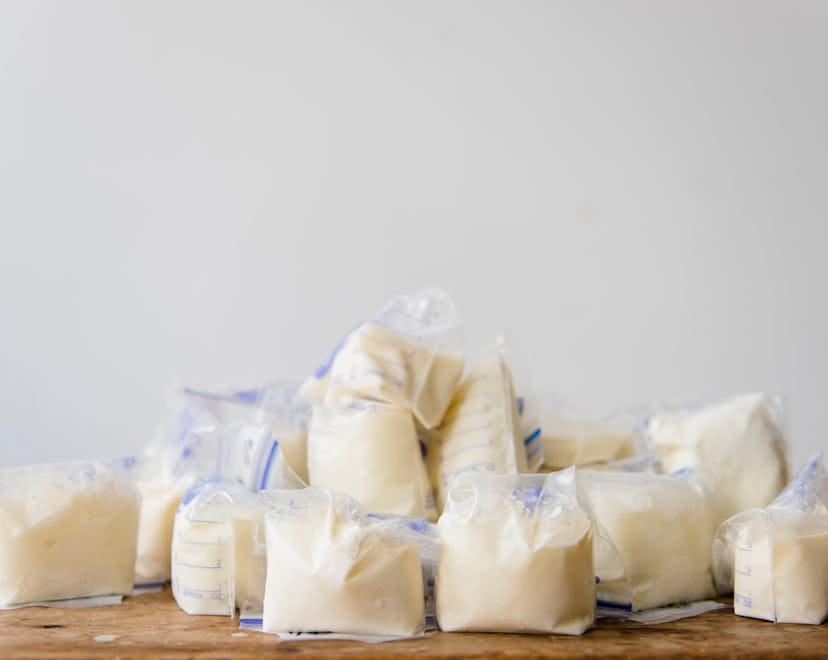Nursing

6 Things Your Lactation Consultant Wants You To Know About Milk Storage
Making the decision to breastfeed your baby is an important one. So you definitely don’t want to see all that liquid gold go down the drain because you didn’t know how to properly store your breast milk. So what are some things your lactation consultant wants you to know about milk storage? The correct info can come in handy for those times when a bottle of breast milk is on the menu for your baby.
Having breast milk at the ready is ideal for those times when you might need someone else to feed baby fast, and necessary if you're a working mom. But since pumping isn’t always the most pleasurable experience (except for when you’re engorged, in which case it can be a total relief), you want to make sure that the product of your pumping sessions goes a long way. “The most important thing about milk storage is that there's a very big difference between storage guidelines for breast milk and formula, so it can get confusing if you are doing a mixture of both,” Darcy Sauers, IBCLC, a lactation consultant, tells Romper. “Formula has to be thrown out after it has been made and been at room temperature for one hour. Breast milk, because it contains antibacterial properties, can stay at room temperature for a lot longer.”
Don’t have a personal lactation consultant to help you through the process? No problem. These three lactation consultants told Romper everything you need to know about breast milk storage do’s and don’ts.
1Store your breast milk in the proper location of your fridge/freezer
Although it might be faster to just reach into your fridge and pull out a bottle of breast milk, it’s best if you place it towards the rear. “Milk can safely be stored in the back of the refrigerator, where it will be the coldest,” Jadah Parks Chatterjee, BS, RN, IBCLC, registered nurse and lactation consultant, tells Romper. “It can be stored in the fridge for up to seven days, too.”
2Label your breast milk
If you though that all breast milk was created equal, think again. There’s a difference between day milk and night milk, so whip out your Sharpie and get ready to label your storage bags. “Label your milk with both the date and the time,” advises Chatterjee. “You want your newborn baby to have day time milk during the day, and nighttime milk at night, since it has higher volumes of fat.”
3Live by The 5-5-5- Rule
When you’re sleep deprived (and bleary-eyed), it can be hard to remember your name, much less when you last pumped your breast milk. That’s where the 5-5-5 rule comes in to play. “The 5-5-5 Rule applies to breast milk storage,” explains Sauers. “Breast milk can be out for five hours at room temperature, for five days in fridge, and for five months in a deep freezer.” Some lactation consultants might even push the 5 to 6 — if you’re looking for the most conservative option, go with the shorter timeline.
4You can mix fresh and frozen breast milk
Breast milk is forgiving in that you can mix and match frozen with fresh and feed it to your baby. “Moms can add fresh milk to frozen milk as long as the amount of the new milk is less than the milk already frozen,” says Tran. “The new milk should be cooled down in the refrigerator for at least an hour before adding it to the frozen milk.” All that’s left is to shake it to combine, and bottle it up for your baby.
5Know your storage container options
When it comes to breast milk storage container options, you’re basically looking at two solutions: bottles or bags. Whichever one you choose is entirely up to you, since there are pros and cons to both methods. “Glass bottles are best, but that gets expensive and takes up a lot of space,” Sauers suggests. “If you are storing lots of milk, bags are the way to go.”
6Breast milk can last longer than formula
You might be worried that once you pump your breast milk it needs to be put in the fridge right away. Not so, according to Andrea Tran, RN, IBCLC, a registered nurse and certified lactation consultant. “Breast milk is very hearty,” says Tran. “Freshly pumped milk can be kept at room temp for up to six hours. So if you accidentally leave out a bottle of breast milk, you still might be able to use it if it falls within that window of time."
Knowing how to properly store your breast milk ensures that you’re storing your milk in a smart and efficient way.
Sources interviewed:
Darcy Sauers, IBCLC, a lactation consultant
Jadah Parks Chatterjee, BS, RN, IBCLC, registered nurse and lactation consultant
Andrea Tran, RN, IBCLC, a registered nurse and certified lactation consultant
This article was originally published on